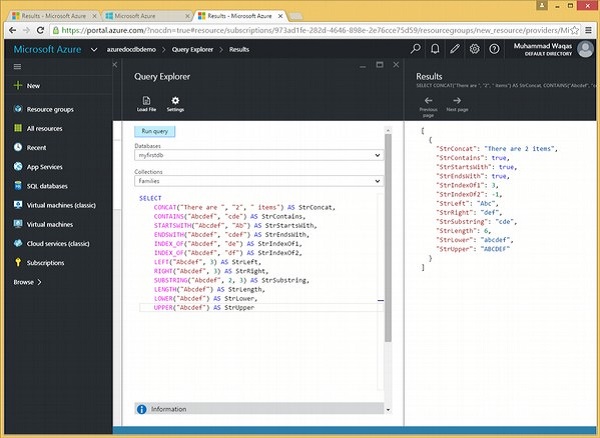
- DocumentDB SQL - Home
- DocumentDB SQL - Overview
- DocumentDB SQL - Select Clause
- DocumentDB SQL - From Clause
- DocumentDB SQL - Where Clause
- DocumentDB SQL - Operators
- DocumentDB - Between Keyword
- DocumentDB SQL - In Keyword
- DocumentDB SQL - Value Keyword
- DocumentDB SQL - Order By Clause
- DocumentDB SQL - Iteration
- DocumentDB SQL - Joins
- DocumentDB SQL - Aliasing
- DocumentDB SQL - Array Creation
- DocumentDB - Scalar Expressions
- DocumentDB SQL - Parameterized
- DocumentDB SQL - Built-in Function
- Linq to SQL Translation
- JavaScript Integration
- User-Defined Functions
- Composite SQL Queries
DocumentDB SQL - String Function
The string functions perform an operation on a string input value and return a string, numeric or Boolean value. Following are the supported built-in string functions.
| S.No. | Function & Description |
|---|---|
| 1 | LENGTH (str_expr) Returns the number of characters of the specified string expression. |
| 2 | CONCAT (str_expr, str_expr [, str_expr]) Returns a string that is the result of concatenating two or more string values. |
| 3 | SUBSTRING (str_expr, num_expr, num_expr) Returns part of a string expression. |
| 4 | STARTSWITH (str_expr, str_expr) Returns a Boolean indicating whether the first string expression ends with the second. |
| 5 | ENDSWITH (str_expr, str_expr) Returns a Boolean indicating whether the first string expression ends with the second. |
| 6 | CONTAINS (str_expr, str_expr) Returns a Boolean indicating whether the first string expression contains the second. |
| 7 | INDEX_OF (str_expr, str_expr) Returns the starting position of the first occurrence of the second string expression within the first specified string expression, or -1 if the string is not found. |
| 8 | LEFT (str_expr, num_expr) Returns the left part of a string with the specified number of characters. |
| 9 | RIGHT (str_expr, num_expr) Returns the right part of a string with the specified number of characters. |
| 10 | LTRIM (str_expr) Returns a string expression after it removes leading blanks. |
| 11 | RTRIM (str_expr) Returns a string expression after truncating all trailing blanks. |
| 12 | LOWER (str_expr) Returns a string expression after converting uppercase character data to lowercase. |
| 13 | UPPER (str_expr) Returns a string expression after converting lowercase character data to uppercase. |
| 14 | REPLACE (str_expr, str_expr, str_expr) Replaces all occurrences of a specified string value with another string value. |
| 15 | REPLICATE (str_expr, num_expr) Repeats a string value a specified number of times. |
| 16 | REVERSE (str_expr) Returns the reverse order of a string value. |
Lets take a look at an example where some built-in string functions are used.

Following is the query with different string functions.
SELECT
CONCAT("There are ", "2", " items") AS StrConcat,
CONTAINS("Abcdef", "cde") AS StrContains,
STARTSWITH("Abcdef", "Ab") AS StrStartsWith,
ENDSWITH("Abcdef", "cdef") AS StrEndsWith,
INDEX_OF("Abcdef", "de") AS StrIndexOf1,
INDEX_OF("Abcdef", "df") AS StrIndexOf2,
LEFT("Abcdef", 3) AS StrLeft,
RIGHT("Abcdef", 3) AS StrRight,
SUBSTRING("Abcdef", 2, 3) AS StrSubstring,
LENGTH("Abcdef") AS StrLength,
LOWER("Abcdef") AS StrLower,
UPPER("Abcdef") AS StrUpper
When the above query is executed, it produces the following output.
[
{
"StrConcat": "There are 2 items",
"StrContains": true,
"StrStartsWith": true,
"StrEndsWith": true,
"StrIndexOf1": 3,
"StrIndexOf2": -1,
"StrLeft": "Abc",
"StrRight": "def",
"StrSubstring": "cde",
"StrLength": 6,
"StrLower": "abcdef",
"StrUpper": "ABCDEF"
}
]